Cleveland Clinic Builds on Trustworthy Content with Renewed Podcast Strategy
// By Melanie Graham //
 Podcasting is a medium that has swept nearly every industry, and experts and amateurs around the globe are producing and publishing thousands of episodes every day. The list of topics is endless, and it seems nearly everyone is plugged into a podcast while commuting or exercising.
Podcasting is a medium that has swept nearly every industry, and experts and amateurs around the globe are producing and publishing thousands of episodes every day. The list of topics is endless, and it seems nearly everyone is plugged into a podcast while commuting or exercising.
So it only makes sense for Cleveland Clinic, one of the country’s leaders in healthcare content marketing, to take advantage of this hugely popular platform.
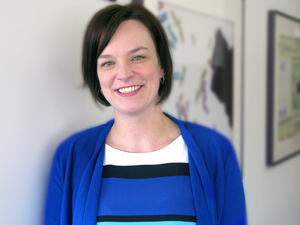
Amanda Todorovich, senior director of content and creative services at Cleveland Clinic
“Our content marketing goal is to have content in all formats for people who are seeking health information,” says Amanda Todorovich, senior director of content and creative services at Cleveland Clinic. “We want to be there to answer those questions in any way they want it, whether it’s online, through the blog, through social media, or podcasts.”
But adding podcasts to Cleveland Clinic’s already robust content offerings wasn’t just about tapping into a popular market. The podcasts are also part of the health system’s goal in creating content that is informative, accurate, and trustworthy.
Building Trust
The idea of building trust in content is at the heart of Todorovich’s content strategy, and a topic she spoke at length about during this year’s Content Marketing World Health Summit.
To build that trust, Todorovich says her team focuses podcast programming on topics their followers are talking about and the questions coming in on social media or through the blog.
“We could have taken a very traditional marketing approach around our strategic priorities, but we actually try to use data from all our content platforms to tell us what our consumers are looking for, and build our shows from there,” Todorovich says.
Facebook Live’s Influence
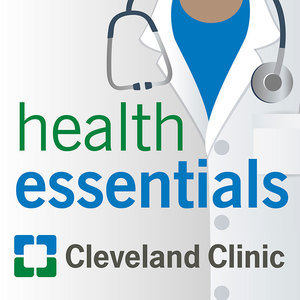
Cleveland Clinic’s Health Essentials podcast is repurposed from existing Facebook Live Q&As. It’s their most popular podcast series to date.
In February 2018, Cleveland Clinic’s podcasting channel featured sporadic episodes on random topics; there wasn’t a large content marketing focus on the platform. Todorovich’s team looked at the channel and realized they wanted to bring that content strategy to their podcasts and have it in the mix of content they were already doing.
“The medium of podcasting had evolved a lot since we started, and we decided that we needed to experiment a bit,” Todorovich says.
While her team was brainstorming how to revamp their podcasts, Cleveland Clinic was also ramping up its efforts on Facebook Live. Its weekly Health Essentials live Q&A is a popular platform where Cleveland Clinic experts answer live questions from Facebook users, with the topic changing each week. With each of those Facebook Live events, Todorovich’s team was creating a set of robust content, including transcripts and blog posts. So they added podcasts to the mix.
Each week, Cleveland Clinic posts a new Health Essentials podcast episode that it repurposes from an earlier Facebook Live event (the team staggers episodes so they don’t release the podcast episode the same week as the Facebook Live event).
Not only is repurposing the content about serving more platforms and audiences, it’s also about using the clinicians’ time efficiently, Todorovich says. Getting a clinician in the studio for 30 or 60 minutes is a valuable resource that her team makes sure to use wisely to produce as much content as possible with that expert knowledge.
Expanding the Channel
Since relaunching their podcast channel in early 2018, Todorovich says the Health Essentials podcast has seen much interest. With that momentum, Cleveland Clinic has launched several other podcast series, including a digestive health series (Butts & Guts), a health survivorship series (The Comeback), and two cardiac series — one that is consumer-facing (Love Your Heart) and another that is for a physician audience (Cardiac Consult).
“Podcasts were a missing piece for us,” Todorovich says. “It’s something we’re doing thoughtfully as we try to see what sticks and what our audience is most interested in.”
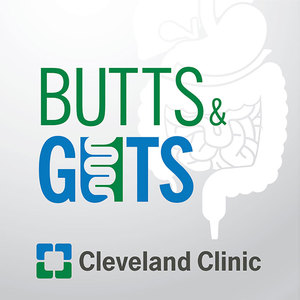
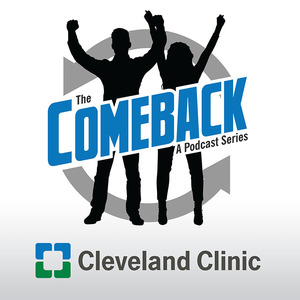

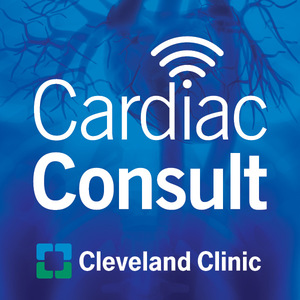
After the success of the Health Essentials podcast, Cleveland Clinic has also rolled out several other series.
As the top-ranked cardiac hospital in the country (U.S. News & World Report), it made perfect sense to launch cardiac-focused podcasts, using experts from Cleveland Clinic’s Heart and Vascular Institute. The podcasts played perfectly into the clinic’s already robust heart content.
The expertly named Butts & Guts podcast was an idea that came from Cleveland Clinic’s colorectal surgery chairman Scott Steele, MD, who already had experience in the podcasting world hosting his own physician-facing series (Behind the Knife). Steele’s intuition for a consumer-facing show has paid off, as it is “performing extremely well and resonating with audiences,” which is especially promising for a series focused on a specific service line (gastrointestinal).

The gastroenterology-focused podcast Butts & Guts is “performing extremely well” for a podcast that covers a specific service line.
“For only being a few months into all of this, we are really happy about where we are,” Todorovich says of the podcasting platform.
Podcasting Logistics
Todorovich emphasizes that the assets needed to produce a podcast can vary greatly and that it’s not always necessary to have the high-caliber equipment and a professional studio.
In the case of the weekly Health Essentials podcast — Cleveland Clinic’s most popular series — the content is repurposed from Facebook Live events recorded and produced by the social media team. On the other end of the spectrum, the cardiac and GI podcasts are recorded in Cleveland Clinic’s studio and involve more production and editing work, so they release less often.
A key point Todorovich makes is that the podcasts are not scripted. This ties into her team’s mission to provide authentic, trustworthy content.
“The Health Essentials podcast, for example, is pulling questions directly from Facebook users,” Todorovich says. “These are not practiced answers and not scripted responses — that goes a long way in building trust.”
Todorovich says her team also coaches physicians to answer honestly. If the physician doesn’t know the answer to a question, he or she should say so. Meanwhile, Todorovich’s team can follow up with answers to those questions in a blog post or future podcast.
Looking Ahead
Podcasts are not the only piece of audio content Cleveland Clinic produces; in November 2017, the health system rolled out Amazon Alexa Flash Briefings, which provide daily health tips to Alexa users.
Considering how the Flash Briefings intersect with podcasts, Todorovich says the Cleveland Clinic content team is focusing more on what the health system’s voice of the health system’s brand sounds like, and where the content intersects in both tone and strategy.
“It’s something we’re deeply considering as an organization — how does this audio content play together when you factor in different devices and user interfaces,” Todorovich says. “Consistency of brand is important.”
As her team continues down the podcast path, Todorovich says they will continue to focus on gaining subscribers and optimizing content based on where consumers are showing interest. They’re also focusing on how to improve audio recording quality and trying to figure out which format and podcast style works best for their audience.
“Just like everything else we do with content, we want to pay attention to that refinement and optimization and evolution, so we’re constantly trying to improve upon what we’re doing,” she says.
For other healthcare content marketers thinking about diving into podcasting, Todorovich says it’s crucial to “start small and experiment.”
“Home in on a specific audience and make sure you are targeting those listeners you are trying to connect with,” she says. “One podcast can’t be for everyone.”
It’s also important to stay flexible, and to not lock yourself into one physician or format; play around with the platform and see what works for your audience.
“Podcasting is a fun place to be experimenting right now,” Todorovich adds. “There is continued interest and an appetite for it, and I’m excited to see where it’s headed.”
Melanie Graham is a writer, editor, and digital strategist specializing in nonprofit and healthcare communications. She has a background in journalism, with experience in digital content marketing and social media management.

